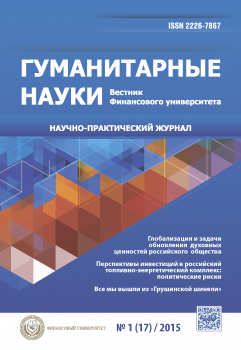The article considers the actual problem of participation of political institutes in the course of forming, implementation and an assessment of public policy on management of the scientific capacity of the higher school of Russia. At the beginning of article the author emphasizes value of this direction of policy (in particular, the higher school carries out double function: implementation of scientific researches and preparation of scientific personnel) also assumes that research of this perspective should be begun with the analysis of its institutional aspects. As methodological and methodical base of research the author of article uses a complex of general scientific methods (the analysis, synthesis, a method of analogies, a comparative and legal method, etc.), and also actively relies on results of sociological and expert polls. The special attention is paid to the deep analysis of programs of political parties which is carried out by the author regarding their relation to problems of development of research activities of higher education institutions. Within article also foreign experience of any participation of “boundary structures” in processes of forming and implementation of a state policy in the field of development of high school science is given. As the main results of research the author allocates: first, the main social and political institutes participating in the considered processes; secondly, confirms subjectivity and independence of the specified institutes; thirdly, reveals the major factors influencing institutional structure of public policy on management of the scientific capacity of the higher school of modern Russia. Among the last are noted: 1) factors of political and cultural nature; 2) current policy of the Ministry of Education and Science of the Russian Federation and her perception high school community; 3) the actual concentration of attention of the state, political parties and other political institutes on adjacent problems of the state scientific and technical policy; 4) traditional secondariness of higher education institutions as subjects of research activities; 5) lobbist activities in the sphere of science. As the perspective directions of researches in the field it is obviously important to consider in details a role of each social and political institute at various stages of lifecycle of a state policy on management of the scientific capacity of the higher school. The received results can form the basis of the new concept of the corresponding direction of public policy.
public policy, political institute, state, political party, boundary structure, group of interests, lobby, scientific capacity of high school
В настоящее время значение высшей школы как ареала не только формирования новых поколений специалистов для всех отраслей национальной экономики, но и генерации нового научного знания не вызывает сомнений. В качестве наиболее показательного примера можно привести Соединенные Штаты Америки, где более половины научных исследований и разработок осуществляются в университетах. Значительна доля вузовской науки в Германии, Великобритании, Канаде и других развитых странах. В связи с этим не может не представлять интерес государственная политика Российской Федерации в области управления научным потенциалом высшей школы. Представляется, что ее исследование логично начинать с анализа общественно-политических институтов, участвующих в процессах формирования политики, ее реализации и оценки.
Обзор научной литературы, нормативно-правовых источников, а также анализ практики государственного управления позволяет выделить в числе основных институтов, участвующих в вышеназванных процессах, следующие структуры:
- различные органы государственной власти (как федерального, так и регионального уровня), а также местного самоуправления;
- политические партии;
- разнообразные группы интересов, «пограничные структуры» и иные непартийные политические институты [4, 6].
Заслуживает внимание точка зрения ряда экспертов, высказывающих сомнения относительно самостоятельности и субъектности приведенных политических институтов (полноценным субъектом политики, по их мнению, выступает только само государство [1, 8]). В связи с этим представляется оправданным краткая характеристика указанных институтов с точки зрения наличия признаков субъектности в данном конкретном случае.
1. Burmatov V.V., Mel’kov S.A., Koshkin A.P., Kartusheva K.A. Gosudarstvennaya politika: mekhanizmy i tekhnologii formirovaniya. Sbornik materialov kruglogo stola, provedennogo v Gosudarstvennoy Dume FS RF [Public policy: mechanisms and imaging technologies. Collection of materials of the round table held in the State Duma of the Russian Federation]. Moscow, Belyy veter Publ., 2014.
2. Znamenskiy D.Yu., Mikhalina O.A. Uchastie politicheskikh institutov v protsesse formirovaniya gosudarstvennoy nauchno-tekhnicheskoy politiki Rossiyskoy Federatsii [Participation of political institutions in the process of formation of the state scientific and technical policy of the Russian Federation]. Vestnik universiteta (Gosudarstvennyy universitet upravleniya) [Bulletin of the University (State University of Management)]. 2013, I. 8, pp. 191-195.
3. Znamenskiy D.Yu. Politicheskie instituty v protsesse formirovaniya gosudarstvennoy nauchno-tekhnicheskoy politiki v sovremennoy Rossii [Political institutions in the process of formation of the state scientific-technical policy in modern Russia]. Moscow, GUU Publ., 2015.
4. Loparev A.V. Institutsionalizatsiya grazhdanskogo obshchestva v sovremennoy Rossii [The institutionalization of the civil society in modern Russia]. Vestnik universiteta (Gosudarstvennyy universitet upravleniya) [Bulletin of the University (State University of Management)]. 2014, I. 16, pp. 48-53.
5. Peregudov S.P. Politicheskaya sistema Rossii v mirovom kontekste: instituty i mekhanizmy vzaimodeystviya [Russia’s political system in the world context: the institutions and mechanisms of interaction]. Moscow, ROSSPEN Publ., 2011, p. 344.
6. Sungurov A.Yu. Kak voznikayut politicheskie innovatsii: “fabriki mysli” i drugie instituty-mediatory [As there are political innovations, “think tanks” and other mediators institutions]. Moscow, Politicheskaya entsiklopediya Publ., 2015.
7. Turovskiy A.A., Aseev A.D. Kharakter vzaimodeystviya biznes-struktur s organami gosudarstvennoy vlasti [The nature of interaction between business entities with public authorities]. Vestnik universiteta (Gosudarstvennyy universitet upravleniya) [Bulletin of the University (State University of Management)]. 2015, I. 6, pp. 10- 14.
8. Brooks S. Public policy in Canada. An Introduction. Toronto: Oxford University Press. 1998. p. IX.
9. Kodzhaspirova G.M. Pedagogicheskiy slovar’ [Teaching Dictionary]. Moscow, Akademiya Publ., 2005.
10. Russkiy orfograficheskiy slovar’ [Russian spelling dictionary]. Rossiyskaya akademiya nauk. In-t rus. yaz. im. V. V. Vinogradova [Russian Academy of Sciences. Institute of Russian. lang]. Moscow, Azbukovnik Publ., 1999.
11. Available at: http://minobrnauki.rf/media/events/files/41d5ba4833829314cd7c.pdf (accessed 02 April 2016).
12. Available at: http://er.ru/party/program/ (accessed 04 August 2016).
13. Available at: http://spravedlivo.ru/5_76349.html (accessed 05 August 2016).
14. Available at: http://ldpr.ru/party/Program_LDPR/ (accessed 05 June 2016).
15. Available at: https://parnasparty.ru/party/platform (accessed 05 June 2016).
16. Available at: http://pravoedelo.ru/party/program/ (accessed 26 May 2016).





